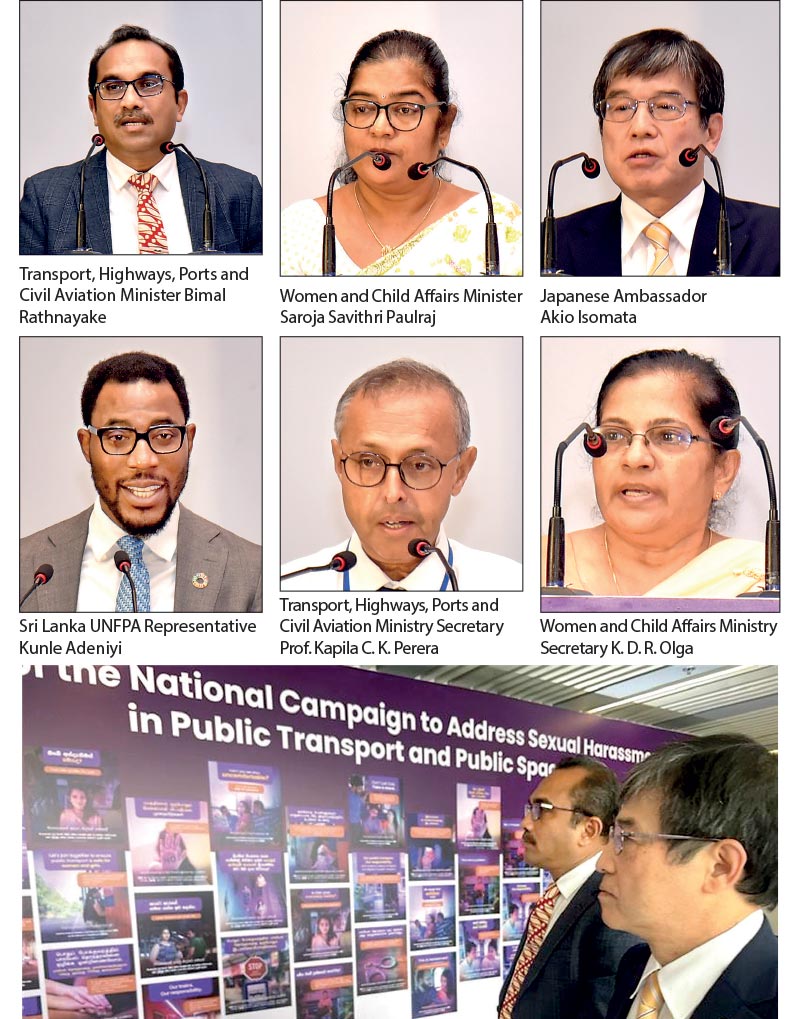Saturday Feb 28, 2026
Saturday Feb 28, 2026
Monday, 28 July 2025 03:25 - - {{hitsCtrl.values.hits}}


By Safna Malik
Sexual harassment in Sri Lanka’s public transport and spaces poses a severe threat to women and girls, limiting their freedom and causing distress. This persistent issue fosters gender imbalance, directly hindering the nation’s economic growth and overall development.
In response to this growing challenge, the Sri Lankan Government, in partnership with the Government of Japan and the United Nations Population Fund (UNFPA), has initiated a national campaign with a mission to create safer, gender-sensitive public spaces and ensure harassment-free travel on public transport for the public in Sri Lanka.
The campaign was officially launched on 23 July, in partnership with the Ministry of Women and Child Affairs and the Ministry of Transport, Highways, Ports and Civil Aviation, with support from UNFPA Sri Lanka and funding from the Government of Japan.
This campaign is also a part of Sri Lanka’s National Action Plan on Sexual and Gender-Based Violence (2024-2028). It aligns with the Government’s vision of a ‘CLEAN Sri Lanka,’ which advocates not only for a clean and modern transport system but also for one that is safe, inclusive, and people-centred.
Speaking on the importance of launching this issue as a national campaign, UNFPA Representative for Sri Lanka Kunle Adeniyi stated, “UNFPA has worked for over 50 years worldwide and nationwide to end violence against women and girls, advocating for zero tolerance. Yet, despite all efforts, violence against women and girls still exists in buses, trains, and public spaces. The public transport system, meant to be a convenient mode of travel for the public and to connect people to school, to work, to opportunities, too often becomes places of fear.”
 Only 4% of incidents reported to Police
Only 4% of incidents reported to Police
He highlighted key findings from a national study revealing that 90% of women and girls in Sri Lanka have experienced sexual harassment on public transport at least once in their lives. Only 4% of these incidents were reported to the Police. The study further indicated that 82% had witnessed harassment, but most of them didn’t know how to respond. Victims also noted a lasting impact on their personal lives. “These aren’t just numbers. They represent real people and their experiences,” he emphasised.
Addressing this issue, UNFPA has collaborated with the Government of Sri Lanka and its partners. Their efforts include a national study conducted in 2015, titled “Sexual Harassment in Public Buses and Trains in Sri Lanka.” This was succeeded by a significant public campaign, “Does She Travel Safe?” in 2017 and 2019, which drew attention to the severity of sexual harassment in public transport in Sri Lanka.
He stated that UNFPA has been also working closely with relevant ministries, the Sri Lanka Transport Board (SLTB), the National Transport Commission (NTC), Sri Lanka Railways, and even Airport and Aviation authorities, to establish a system where respect and safety are not optional but standard.
Speaking about awareness efforts, he highlighted that training sessions on Gender-Based Violence (GBV) and bystander actions have been conducted for driving instructors and senior management of provincial transport authorities across seven provinces in Sri Lanka. These trainings are also actively ongoing for private and Government bus drivers, conductors, and train staff.
UNFPA is supporting the development of a Code of Conduct for transport sector staff and workers, and has initiated the integration of a Gender and GBV training module into the national training curriculum for public transport sector institutions. Additionally, in a joint program with the International Labour Organisation (ILO) and the United Nations Educational, Scientific and Cultural Organisation (UNESCO), UNFPA has facilitated the gender sensitisation of newly formed workplace forums in the SLTB, NTC, Sri Lanka Railways, and the Ports Authority.
Adeniyi also shared plans to extend these training sessions to the Civil Aviation Authority and Airport Terminal Services by the end of this month, aiming to create safe spaces for redress and dialogue.
Collective action
To achieve zero tolerance for GBV, UNFPA stressed the need for a whole of Government approach involving the Ministry of Transport Ministry, Women and Child Affairs Ministry, Technology Ministry, Public Security Ministry, and Mass Media Ministry to ensure safe public transport for women and girls. He mentioned a collective action, based on this approach, can encourage the private sector, development partners, and civil society to invest more in addressing and preventing GBV.
Adeniyi also suggested the importance of raising awareness among children by integrating lessons on respect, consent, and harassment prevention into school curricula. This would help children to understand the gravity of sexual harassment, speak out against it, and help build a generation, a culture that values safety and dignity for all.
He detailed the campaign’s planned awareness initiatives. These include a series of short videos promoting bystander action in all three languages, alongside posters, leaflets, and pocket cards prominently displaying reporting hotline numbers. Digital messages will also be deployed in key locations, complemented by extensive social media outreach and announcements from transport sector authorities. All these efforts are aimed at ensuring harassment-free public transport.
Crucially, key helpline numbers will be prominently featured on all campaign materials. These include the Women’s Helpline (1938) and the Police Children and Women Bureau (109), designed to encourage reporting and ensure access to vital support services.
Women and Child Affairs Minister Saroja Savithri Paulraj added,
“Gender-based violence in public spaces is not only a safety concern. It is a human rights issue. Sexual harassment on buses, trains, and at terminals restricts freedom of movement and undermines women’s access to education, livelihoods, and public life. It is our responsibility to ensure safety for all, especially women and girls.”
Part of a broader issue
She emphasised that sexual harassment on public transport is part of a broader issue faced by women globally, at home, in the workplace, and in public spaces. This can result in incidents of rape. Such harassment limits women’s mobility and reflects deeper gender imbalances within society. It also violates fundamental rights and creates an environment of insecurity, limiting their full participation in public life, employment, and education.
She stressed the significant challenges women face in coping with such violence, noting it hinders their ability to travel peacefully on public transport.
She added that with many attempting to normalise sexual harassment and gender-based violence, there is an urgent need to break the culture of silence. These actions, she insists, should no longer be quietly endured by women and girls. Instead, they must be actively challenged, prevented, and their perpetrators held accountable. She points out that sexual harassment is, in fact, a criminal offense, potentially leading to a maximum of five years imprisonment and charges against the accused.
Transport, Highways, Ports and Civil Aviation Minister Bimal Rathnayake explained his vision for the country’s transport system. He stated that the ministry is making safety a fundamental part of all its transport reforms, to ensure that safe travel is no longer a special benefit, but a basic right for every individual.
Rathnayake also affirmed the Government’s commitment to ensuring sexual harassment has no place in public transportation, including buses, trains, or stations. He emphasised that protecting women and girls and providing them with convenient and safe travel is a Government responsibility. The Transport, Highways, Ports and Civil Aviation Ministry will provide full support to mitigate gender-based violence in public transport services and spaces, making this a reality.
Ambassador of Japan to Sri Lanka Akio Isomata highlighted the significance of the ongoing project and the national campaign’s launch. He noted that the Japanese Government is proud to be a key partner in this campaign, funding and promoting gender equality and public safety in Sri Lanka. Ambassador Isomata further stressed, “Preventing and addressing sexual harassment in public transport would create a safe environment for women.” He explained that this is crucial for mobilising the female labour force in the economy and empowering women’s participation in society.
Awareness-raising for zero tolerance
He also stated that awareness-raising for zero tolerance on sexual harassment is a very important step as it serves as a clear warning to potential perpetrators, shares knowledge with victims on how to deal with the situations, and encourages bystanders to take action to help the victims.
Isomata also shared how the Japanese Government tackled sexual harassment on public transport by installing CCTV cameras in all public transport modes, including buses and trains, and introducing mobile apps with alarm or call-for-help features to deter perpetrators, which successfully controlled such activities. He urged the Government of Sri Lanka, in collaboration with local Governments and other stakeholders, to utilise the resources provided by the project to strengthen the awareness-raising campaigns throughout the island.
The launch featured an interactive exhibition showcasing campaign materials, survivor stories, and information booths on reporting mechanisms and bystander intervention. Campaign videos and digital messages will begin rolling out nationwide from today.
-Pix by Ruwan Walpola